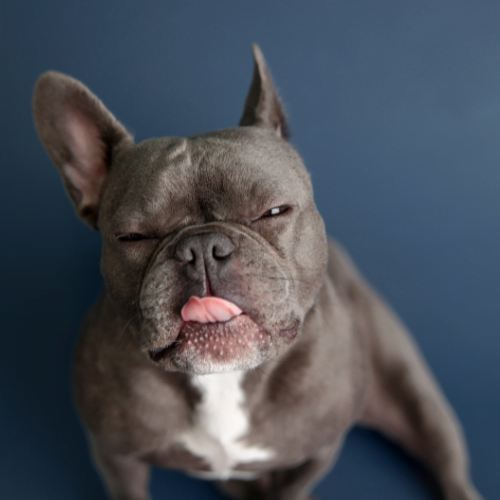Estimated reading time: 3 minutes
French Bulldogs are fascinating dogs that have stolen the hearts of many dog lovers worldwide with their adorable faces and lovable personalities. A unique aspect of this breed is the variety of noises they make, which can be both endearing and puzzling. In this article, we’ll dive into the world of French Bulldog noises, helping you understand and appreciate their quirky “language.”
Common French Bulldog Noises
Snorting
First up, let’s talk about snorting. Frenchies are known for their short snouts, which can cause them to snort when they’re excited or sniffing around. Usually, snorting is nothing to worry about, but keep an eye on your pup to make sure it doesn’t signal breathing difficulties.
Whining
Next, we have whining. Just like any other dog, French Bulldogs might whine when they’re seeking attention, feeling anxious, or experiencing discomfort. To address this, try to identify the cause of their whining and address it accordingly, whether it’s providing comfort, playtime, or a bathroom break.
Barking
Now, let’s discuss barking. French Bulldogs typically bark for various reasons, such as alerting you to a stranger or expressing their excitement. To manage excessive barking, consider using positive reinforcement training and ensure your Frenchie gets plenty of mental and physical stimulation.
Growling
Lastly, there’s growling. Frenchies might growl playfully during a game of tug-of-war or to communicate their boundaries. However, aggressive growling can be a cause for concern. If your dog displays aggressive behavior, consult a professional dog trainer for guidance.
Health-related French Bulldog Noises
Reverse sneezing
Reverse sneezing is a common phenomenon in French Bulldogs, characterized by rapid inhaling through the nose. This can be triggered by irritants, excitement, or a sudden change in temperature. To help your Frenchie during a reverse sneezing episode, try massaging their throat or covering their nostrils briefly.
Heavy breathing and snoring
Due to their brachycephalic nature, French Bulldogs often experience heavy breathing and snoring. While this is usually normal, be sure to monitor your pup for signs of respiratory distress, such as labored breathing or blue gums. To improve their respiratory health, maintain a healthy weight and avoid overexertion during hot weather.
Communicating with Your French Bulldog
Understanding your Frenchie’s unique “language” is key to building a strong bond. By paying attention to their noises and body language, you can effectively respond to their needs and ensure their well-being. Always be vigilant for signs of distress or discomfort, as these may indicate a more serious issue.
Tips for Reducing Excessive French Bulldog Noises
Creating a calm and peaceful environment
To keep your Frenchie’s noises to a minimum, create a calm and peaceful environment. This includes providing a comfortable bed, reducing loud noises, and offering a consistent routine.
Training techniques for noise management
Investing in obedience training can help teach your French Bulldog to control their vocalizations. Use positive reinforcement techniques and stay consistent with your training sessions.
When to seek professional help
If your Frenchie’s noises become a persistent issue, don’t hesitate to consult with a professional dog trainer or veterinarian for guidance.
Conclusion
Understanding and appreciating your French Bulldog’s unique noises is essential for fostering a loving, supportive relationship. Embrace your Frenchie’s quirky sounds and use this knowledge to communicate effectively, ensuring their happiness and well-being.








